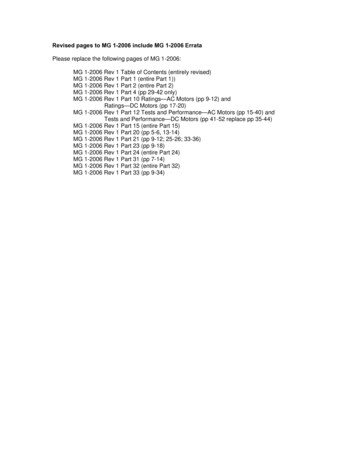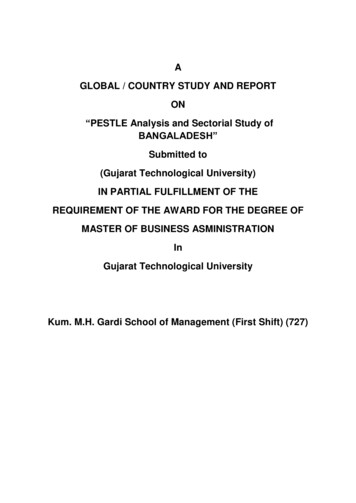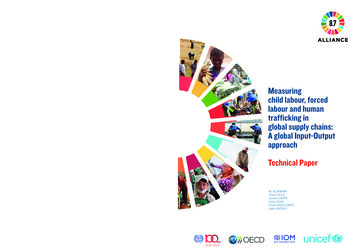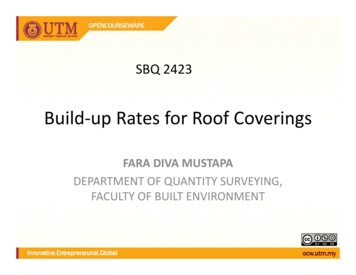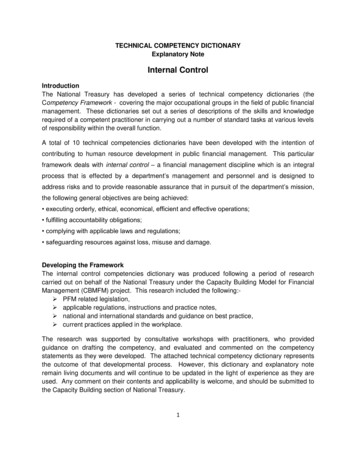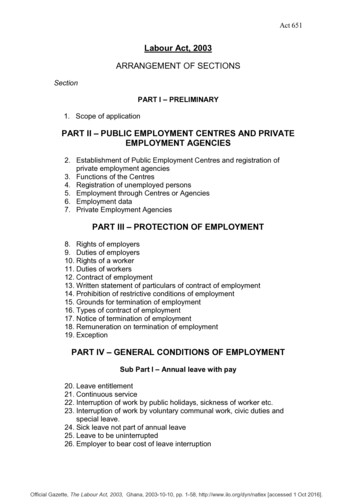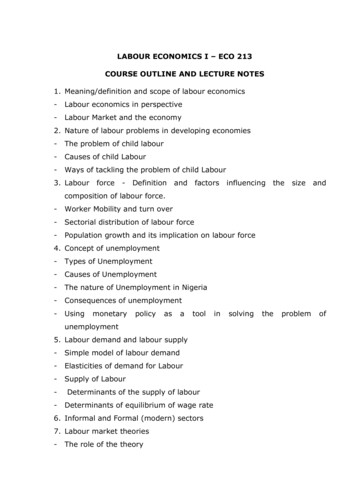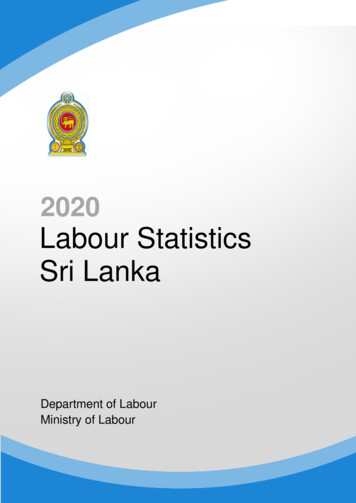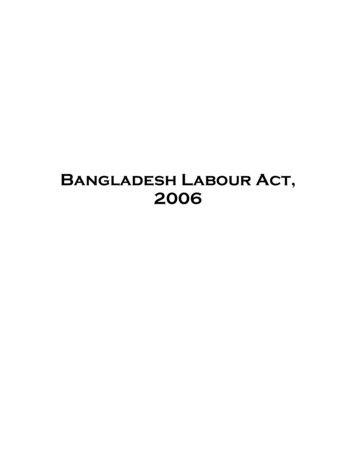
Transcription
Bangladesh Labour Act,2006
Bangladesh Labour Act, 2006(XLII of 2006)SectionContentPageCHAPTER 1PRELIMINARY1. Short title, commencement and application2. Definitions:(i) Retirement(ia) Partial disablement(ii) Manufacturing process(iii) Officer(iv) hours of week(v) Working journalist(vi) Workshop(vii) Factory(viii) adolescent(ix) mine(x) gratuity(x-a) tea plantation(xi) Retrenchment(xii) public utility service(xiii) Tribunal(xiv) Transmission machinery(xv) Trade union(xvi) Federation of trade unions(xvii) Discharge(xviii) Go-slow(xix) Day(xx) Code of civil procedure(xxi) Shop(xxii) Strike(xxiii) Seamen(xxiv) Executive committee(xxv) Settlement(xxvi) River Transport service(xxvii) Vessel(xxviii) Administrative worker(xxix) Shift(xxx) Dependant(xxxi) Establishment(xxxii) Group of establishments(xxxiii) Regulation(xxxiv) Maternity benefit1
(xxxv) prime mover(xxxvi) Adult(xxxvii) Code of Criminal Procedure(xxxviii) Closed(xxxix)Dismissal(xL) Plantation(xli) Commercial establishment(xlii) Rule(xliii) Illegal strike(xliv) Illegal lock-out(xlv) Wages(xlvi)Arbitrator(xlvii) Chief Inspector(xlviii) Director of Labour(xlix) Employer(L) Machinery(Li) Vehicle(Lii) Collective bargaining agent(Liii) Relay(Liv) Registered Medical practitioner(Lv) Registered trade union(Lvi) Award(Lvii) Lock-out(Lviii) Lay-off(Lix) Power(Lx) Industry(Lxi) Industrial establishment(Lxii) Industrial dispute(Lxiii) Child(Lxiv) Labour court(Lxv) Worker(Lxvi) Week(Lxvii) Total disablement(lxviii) Road transport service(Lxix) Newspaper(lxx) Newspaper press worker(Lxxi) Newspaper establishment(Lxxii) newspaper worker(Lxxiii) Conciliator(Lxxiv) Conciliation proceedings(Lxxv) Serious bodily injury(Lxxvi) Decision(Lxxvii) Scheme2
CHAPTER IICONDITIONS OF SERVICE AND EMPLOYMENT3. Condition of employment4. Classification of workers and period of probation5. Latter of Appointment and Identity Card6. Service book7.Form of Service book8. entries in the service book9. Register of workers and supply of tickets and cards10. Procedure for leave11. Payment of wages for unveiled leave12. Stoppage of work13. Closure of establishment14. Calculation of one year ‘six months ‘and wages ’in certain cases15. Restriction of application of sections 12,16,17, and 1816. Right of laid-off workers for compensation17. Muster-roll for laid –off workers18. Laid –off workers not entitled to compensation in certain cases19. Death benefit20. Retrenchment21. Re-employment of retrenched workers22. Discharge from service23. Punishment for conviction and misconduct24. Procedure for punishment25. Special provisions relating to fine26. Termination of employment by employers otherwise than by dismissal etc.27. Termination of employment by workers28. Retirement of workers29. Payment of Provident Fund30. Time limit of final payment of workers31. Certificate of service32. Eviction from residential accommodation33. Grievance procedure3
CHAPTER IIIEMPLOYMENT OF ADOLESCENT34. Prohibition of employment of children and adolescent35. Prohibition of certain agreement in respect of children36. Disputes as to age37. Certificate of fitness38. Power to require medical examination39. Restriction of employment of adolescent in certain work40. Employment of adolescent on dangerous machines41. Working hours for adolescent42. Prohibition of employment of adolescent in underground and under water work43. Notice of periods of work for adolescent44. Exception in certain cases of employment of childrenCHAPTER IVMATERNITY BENEFIT45. Employment of women workers prohibited during certain period46. Right to and liability for payment of maternity benefit47. Procedure regarding payment of maternity benefit48. Amount of maternity benefit49. Payment of maternity benefit in case of a women s death50. Restriction on termination of employment of women in certain caseCASES---CHAPTER VHEALTH AND HYGIENE51. Cleanliness52. Ventilation and temperature53. Dust and fume54. Disposal of wastes and effluents55. Artificial humidification56. Overcrowding57. Lighting58. Drinking Water59. Latrines and urinals60. Dust bean and Spittoon4
CHAPTER VISAFETY61. Safety of building and machinery62. Precaution in case of fire63. Fencing of machinery64. Work on or near machinery in motion65. Striking gear and devices for cutting off power66. Self – acting machines67. Casing of new machinery68. Cranes and other lifting machinery69. Hoists and lifts70. Revolving machinery71. Pressure plate72. Floors , Stairs and means of access73. Pits-.sumps ,opening in floors etc.74. Excessive weights75. Protection of eyes76. Powers to require specifications of defective parts or tests of stability77. Precaution against dangerous fumes78. Explosive or inflammable dust, gas .etcCHAPTER VIISPECIAL PROVISIONS RELATING TO HEALTH, HYGIENE ANDSAFETY.79. Dangerous operations80. Notice to be given of accidents81. Notice of certain dangerous occurrences82. Notice of certain disease83. Power to direct enquiry into cases of accident or disease84. Power to take samples85. Power of Inspector in case of certain danger86. Information about dangerous building and machinery87. Restriction of employment of women in certain work88. Power to make rules to supplement this Chapter5
CHAPTER VIIIWELFARE89. First –aid appliances90. Maintenance of Safety Record Book91. Washing facilities92. Canteens93. Shelters etc.94. Rooms for Children95. Recreational and educational facilities in tea plantation96. Housing facilities in tea plantation97. Facilities for daily necessities ,etc in tea plantation98. Medical care for newspaper workers99. Compulsory Group InsuranceCHAPTER IXWORKING HOURS AND LEAVE100. Daily hours101. Interval for rest or meal102. Weekly hours103. Weekly holiday104. Compensatory weekly holiday105. Spread over106. Night shift107. Restriction on cumulative hours of work on a vehicle108. Extra –allowance for work overtime109. Limitation of hours of work for women110. Restriction on double employment111. Notice of periods of work for adults and preparation thereof112. Special age limit for road transport service worker113. Hours of work to correspond with notice and register114. Closure of shops etc.115. Casual leave116. Sick leave117. Annual leave with wages118. Festival holiday119. Calculation of wages and payment during leave or holiday period.Period-------6
CHAPTER XWAGES AND PAYMENT120. Special definition of wages121. Responsibility for payment of wages122. Fixation of wage-periods123. Time of payment of wages124. Wages to be paid in current coin or currency notes125. Deduction which may be made from wages126. Deductions for absence from duty127. Deductions for damage or loss128. Deductions for services rendered129. Deductions for recovery of loans or advances130. Other deductions from wages131. Payment of undisguised wages in cases of death of workers132. Claims arising out of deductions from wages or delay in payment of wages133. Court fees in proceeding under section 132134. Single application in respect of a clad of workers whose wages have not been paid orwages deducted135. Appeal136. Conditional attachment of property of employer or other person responsible for payment ofwages137. Power to recover from employer in certain casesCHAPTER XIWAGES BOARDS138. Establishment of Minimum Wage Board139. Recommendation of minimum rate of wages for certain workers140. Power to declare minimum rates of wages141. Factory to be considered in making its recommendation142. Periodical review of minimum rates of wages143. Constitution of newspaper workers wage Board144. Fixation of wages145. Publication of decision on Newspaper Wage Board146. Power of Newspaper wage Board to fix interim rates of wages147. Application to labour court148. Minimum wages to be binding on all employers149. Prohibition to pay wages at rate below the minimum rate of wages7
CHAPTER XIIWORKERS COPENSATION FOR INJURY BY ACCIDENT150. Employers Liability for compensation151. Amount of compensation152. Method of calculating wages153. Review154. Commutation of monthly payments155. Distribution of compensation156. Compensation not to be assigned, attached or charged157. Notice and claim158. Power to require from employers statements regarding fatal accidents159. Reports of fatal accidents160. Medical examination161. Compensation on Contracting162. Insolvency of employer163. Special provision relating to masters and seamen164. Returns as to compensation165. Contracting out166. Reference to Labour Courts167. Venue of Proceedings168. Condition of Application169. Power of Labour Court to require further deposit in cases of fatal accident170. Registration of agreements171. Effect of failure to register agreement172. Appeals173. Withholding of certain payments pending decision of appeal174. Rules to give effect to arrangement with other countries for the transfer of money paid ascompensationCHAPTER XIIITRADE UNION AND INDUSTRIAL RELATIONS175. Special definition of worker176. Trade unions of workers and employers177. Application for registration178. Requirements for applications179. Requirements for registrations180. Disqualification for being an officer or a member of a trade union181. Registered trade union to maintain register etc.182. Registration183. Registration of trade union in a group of establishments184. Registration of trade union in civil aviation establishments185. Registration of trade union by deamen186. Conditions of services to remain unchanged while application for registration8
187. President etc. not be transferred188. Certain changes in the constitution and executive to be notified189. Certificate of registration190. Cancellation of registration191. Appeal against permission, Etc.192. No trade union to function without registration193. Restriction on dual membership194. Incorporation of registered trade union195. Unfair labour practices on the part of employers196. Unfair labour practices on the parts of workers197. Law of conspiracy limited in application198. Immunity from civil suit in certain case199. Enforceability of agreement200. Registration of federation of trade union201. Returns202. Collective bargaining agent203. Federation of trade Union to act as collective bargaining agent in certain cases204. Check –off205. Participation Committee206. Functions of Participation Committee207. Meetings of the Participation Committee208. Implementation of recommendations of Participation CommitteeCHAPTER XIVDISPUTES, LABOUR COURT, LABOUR APPELLATETRIBUNAL, LEGAL PROCEEDINGS, ETC.209. Raising of industrial disputes210. Settlement of industrial disputes211. Strike and lock-out212. Cessation of industrial disputes213. Application to Labour Courts214. Labour Courts215. Procedure and powers of Labour Courts in trial of offences216. Procedure and powers of labour Courts in any matter other than trial of offences217. Appeal from Judgments etc. of Labour Courts218. Labour Appellate Tribunal219. Form of application or appeal220. Appearance of parties (Costs)221. Costs222. Settlement and awards on whom binding223. Effective date of settlements, awards Etc.224. Commencement and conclusion of proceedings9
225. Prohibition on serving notice of strike or lock-outs while proceeding pending226. Power of labour court and tribunal to prohibit strike etc.227. Illegal strikes and lock-outs228. Conditions of service to remain unchanged while proceedings pending229. Protection of certain persons230. Representation of parties231. Interpretation of settlements and awardsCHAPTER XVWORKERS PARTICIPATION IN COMPANIES PROFITS232. Application of the Chapter233. Definitions234. Establishment of Participation Fund and welfare Fund235. Management of Funds236. Penalty237. Power to call for information238. Settlement of disputes, etc239. Delegation of power240. Investment of Participation Fund241. Eligibility to benefits242. Utilization of Participation Fund243. Utilization of Welfare Fund244. Fiscal concessions to the companies245. Tax treatment of income of the Funds246. Tax treatment of income of the workers247. Working and location of Board of Trustees248. Audit of accounts of the Fund249. Funds Benefits to be in addition to other benefits250. Special provisions for industries working seasonally251. Companies engaged in more than one industrial undertaking252. Entrustment of management of Participation Fund to Investment Corporation of Bangladesh,etc.CHAPTER XVIREGULATION OF EMPLOYMENT AND SAFETY OF DOCK WORKERS253. Power to make schemes254. Dock workers Management Boards255. Composition of a board256. Meetings257. Functions of a Board.258. Advisory Committee10
259. Appointment of officers and employees.260. Fund261. Budget262. Delegation of powers263. Special provisions for safety, etc. of dock-workersCHAPTER XVIIPROVIDENT FUNDS264. Provident Funds for workers ii private sector establishments265. Tea plantation workers ‘provident fund’266. Board of Trustees267. Cost of administration268. Contributions269. Recovery of damages270. Provident fund not liable to attachment271. Priority of payment of contribution over other debts272. Employer not to reduce wages or other amenities273. Provident fund for Newspaper workersCHAPTER XVIIIAPPRENTICESHIP274. Application of the Chapter275. Special definition276. Tripartite Advisory committee277. Obligations of employers278. Relief from income –tax ,etc279. Advice and guidance to employers280. Obligations of apprentices281. Powers of entry, inspection, etc.282. Delegation of powersCHAPTER XIXPENALTY AND PROCEDURE283. Penalty for non-compliance of Labour Court’s order under section-33284. Penalty for employment of child and adolescent285. Penalty for making agreement in respect of a child in contravention of section-35286. Penalty for contravention of the provisions of chapter IV by an employer287. Penalty for working for payment during permitted period of absence288. Penalty for contravention of section 67289. Penalty for Payment or wages at a rate below the minimum rate of wages290. Penalty for failure to give notice of accidents291. Penalty for unfair labour practices11
292. Penalty for committing breach of settlement, etc.293. Penalty for failing to implement settlement, etc.294. Penalty for illegal strike or lock-out295. Penalty for instigating illegal strike or lock-out296. Penalty for taking part in or instigating go-slow297. Penalty for contravention of section 228298. Penalty for misappropriation of provident funds and trade union funds299. Penalty for activities of unregistered trade unions300. Penalty for dual membership pf trade unions301. Penalty for non-compliance with the provisions of section 210 (7)302. Penalty for using false certificates of fitness303. Penalty for false statements, etc304. Penalty for wrongful disclosure of information305. Penalty for general offences by workers306. Penalty for general offences by workers307. Penalty for other offences308. Enhanced penalty after previous conviction309. Penalty for contravention of law with dangerous results310. Power of courts to make orders311. Onus as to age312. Offences by companies, etc.313. Cognizance of offences314. Limitation of prosecution315. Report of offences316. Withdrawal of casesCHAPTER XXADMINISTRATION, INSPECTION. ETC.317. Director of Labour of Labour, etc.318. Chief Inspector, etc.319. Powers of chief Inspector, etc.320. Controller of Tea Plantation Worker’ Provident fund321. Accounts and audit322. Reports, etc323. National Council for Industrial health and safetyCHAPTER XXIMISCELLANEOUS324. Power to exempt325. Notice to chief Inspector before commencement of work326. Approval of plans and fees for licensing and registration327. Appeals from certain orders of Inspectors328. Seasonal factories12
329. Recovery of money due under this Act.330. No deduction for any facilities provided331. Obligation of workers332. Conduct towards female workers333. Service of notices and returns334. Certain persons to be public servants335. Indemnity336. Protection of existing conditions of employment337. Abstracts of the Act. Rules and Regulations to be displayed338. Liability of owner of premises in certain circumstance339. Powers to collect information340. Presumption as to employment341. Restriction on disclosure of information342. Certain matters to be kept confidential343. Protection of proceedings of Boards344. General provisions relating to tenure. power, procedures, etc. of boards345 Payment of equal wages for equal work346. Court fees in general347. Restriction upon certain questionings etc.348. Training on this Act349. Certain activities of trade union prohibited350. Bar to jurisdiction of other courts351. Power to make rules352. Provision for penalty in rules, regulations and schemes353. Repeal and savings354. Original Text and Authentic English Text13
THE BANGLADESH LABOUR ACT, 2006(XLII OF 2006)11th October, 2006.An Act to consolidate and amend the laws relating to employment of labour, relations betweenworkers and employers,. determination of minimum wage, payment of wages and compensation forinjuries to workers, formation of trade unions, raising and settlement of industrial disputes, health,safety, welfare and working conditions of workers, and apprenticeship and matters ancillary thereto.Whereas it is expedient to consolidate and amend the laws relating to employment of labour,relations between workers and employers, determination of minimum wages, payment of wages andcompensation for injuries to workers, formation of trade unions, raising and settlement of industrialdisputes, health, safety, welfare and working conditions of workers, apprenticeship and mattersconnected therewith;It is hereby enacted as follows-CHAPTER IPRELIMINARY1. Short title, commencement and application: (1) This Act may be called the Bangladesh labourAct, 2006(2) It shall come into force at once.(3) Save as otherwise specified elsewhere in this Act, it extends to the whole of Bangladesh.(4) Notwithstanding anything contained in sub-section (3), this Act shall not apply to(a) Offices of or under the Government;(b) Security printing press;(c) Ordnance factories;(d) establishments for the treatment or care of the sick, infirm, aged, destitute, mentally disabled,orphan, abandoned child, widow or deserted woman, which are not run for profit or gains;(e) Shops or stalls in any public exhibition or show which deal in retail trade and which issubsidiary or to the purpose of such exhibition or show;(f) Shops or stalls in any public fair or bazaar for religious or charitable purpose;(g) Educational, training and research institutions;(h) Hostels and messes not maintained for profit or gains;(i) In respect of chapter, ii, any shop, commercial establishment or industrial establishment ownedand directly managed by the government where the workers are governed by conduct rulesapplicable to government servants;(j) workers whose recruitments and terms and conditions of service are governed by laws or rulesmade under article 62, 79, 113, or 133 of the constitution, except, for the purposes of chapters XII,XIII and XIV workers employed by the(i) Railway Department(ii) Posts, Telegraph and Telephone Departments,(iii) Roads and highways Department, (iv) Public works Department, (v) Public Health EngineeringDepartment,14
(vi) Bangladesh Government press.(k) Workers employed in an establishment mentioned in clauses (b), (c) (d), (e), (f), (g) and (h) butworkers other than teachers, employed by any university shall not be subject to the restrictionsexcept the purposes of chapters XII, XIII and XIV;(l) Seamen, except for the purposes of chapters XII, XIII and XIV;(m) Ocean going vessels, except for the purpose of chapter XVI;(n) agricultural farms where less than ten workers are normally employed;(o) domestic servants; and(p) establishments run by the owner with the aid of members of his family and without employingany hired labour.2. Definitions: In this Act, unless there is anything repugnant in the subject or context,(i) ‘Retirement’ Means normal termination of employment of a worker on attaining certain ageunder section 28 of the Act.Provided that retirement shall also include voluntary retirement from service on completion of 25years of service in any establishment.(ia) ‘partial disablement’ means, where the disablement is of temporary nature, such disablement asreduces the earning capacity of a worker in any employment in which he was engaged at the time ofthe accident resulting in the disablement, and, where the disablement is of a permanent nature, suchdisablement as reduces his earning capacity in every employment which he was capable ofundertaking at that time:Provided that every injury specified in the First Schedule shall be deemed to result in permanentpartial disablement;(ii) ‘manufacturing process’ means any of the following processes(a) for making, altering, repairing, ornamenting, painting, washing, finishing, packing or otherwisetreating any articles or substance with a view to its use, sale, transport, delivery, display or disposal,(b) for pumping, oil, gas water, sewerage or other fluids or slurries,(c) for generating, transforming or transmitting power or gas,(d) for constructing, reconstructing, repairing, refitting, finishing or breaking up of ships or vessels,or(e) for printing by letter press, lithography, photogravure, computer, photocompose, offset or othersimilar work or book-binding which is carried on by way or trade or for purposes of gain orincidental to another business so carried on;(iii) officer’ in relation to a trade union, means any member of the executive thereof, but does notinclude an auditor or legal adviser;(iv) ‘hours of work’ means the time during which the workers employed are at the disposal of theemployer excluding any interval allowed for rest and meals;(v) ‘working journalist’ means a person who is a whole time journalist and is employed as such in,or in relation to, any newspaper establishment, and includes an editor, leader writer, news editor,sub-editor, feature writer, reporter, correspondent, copy tester, cartoonist, news-photographer,calligraphist and proof-reader;15
(vi) ‘workshop’ means any premises, including the precincts thereof, wherein any industrial processis carried on.(vii) ‘factory’ means any premises including the precincts thereof whereon five or more workersordinarily work on any day of the year and in part of which a manufacturing process is being carriedon, but does not include a mine;(viii) ‘adolescent’ means a person who has completed his fourteenth year but has not completedeighteenth year of age;(ix) ‘mine’ means any excavation where any operation for the purpose of searching for or obtainingminerals has been or is being carried on, and includes all works, machinery, tram-ways and sidings,whether above or below ground, in or adjacent to or belonging to a mine;provided that it shall not include any part of such premises on which a manufacturing process isbeing carried on unless such process is a process for pulp making or the dressing of minerals;(x) ‘gratuity’ means wages payable on termination of employment of a worker which shall beequivalent to not less than thirty days’ wages for every completed year of service or for any partthereof in excess of six months;It shall be in addition to any payment of compensation or payment in lieu of notice due totermination of services of a worker on different grounds.(x-a) ‘tea plantation’ means any land used or intended to be used for growing tea, and includes a teafactory;(xi) ‘retrenchment’ means the termination by the employer of services of workers, not as a measureof punishment but on the ground of redundancy;(xii) ‘public utility service’ means(a) the generation, production, manufacture, or supply of electricity, gas, oil or water to the public,(b) any system of public conservancy o sanitation,(c) hospitals and ambulance service,(d) fire-fighting service,(e) postal, telegraph or telephone service,(f) railways, airways, road and river transport,(g) ports,(h) watch and ward staff and security services maintained in any establishment,(i) oxygen acetylene, and(j) banking;(xiii) ‘Tribunal’ means the labour appellate tribunal established under this Act;(xiv) ‘transmission machinery’ means any shaft, wheel, drum, pulley system of pulleys, couplings,clutch, driving belt or other appliance or device by which the motion of a prime mover istransmitted to or received by any machinery or plant’s(xv) ‘trade union’ means trade union of workers or employers formed and registered under chapterXIII of this Act and shall include a federation of trade unions.16
(xvi) ‘federation of trade unions’ means a federation of trade unions registered under chapter XIII(xvii) ‘discharge’ means the termination of services of a worker by the employer for reasons ofphysical or mental incapacity or continued ill-health of a worker;(xviii) ‘go-slow’ means an organized, deliberate and purposeful slowing down of normal output ofwork by a body of workers in a concerted manner, and which is not due to any mechanical defect,breakdown of machinery, failure or defect in power supply or in the supply of normal material andspare parts of machinery;(xix) ‘day’ means a period of twenty-four hours beginning at 6.00 am(xx) ‘code of civil procedure’ means code of civil procedure, 1908(vof 1908).(xxi) ‘shop’ means any premises used wholly or in part for the whole-sale or retail sale ofcommodities or articles either for cash or credit, or where services are rendered to customers, andincludes an office, store-room, godown, warehouse or workplace, whether in the same premises orelsewhere, mainly used in connection with such trade or business, and such other premises as thegovernment may, by notification in the official gazette, declare to be a shop for the purpose of thisAct;(xxii) ‘strike’ means cessation of work by a body of persons employed in any establishment actingin combination or a concerted refusal, or refusal under a common understanding of any number ofpersons who are or have been so employed to continue to work or to accept employment;(xxiii) ‘seamen’ means any person forming part of the crew of any ship, but does not include themaster of the ship;(xxiv) ‘executive committee’ in relation to a trade union means the body of persons, by whatevername called, to which the management of the affairs of a trade union is entrusted by its constitution:(xxv) ‘settlement’ means a settlement arrived at in the course of a conciliation proceeding, andincludes an agreement between an employer and his worker arrived at otherwise than in the courseof any conciliation proceedings, where such agreement is in writing, has been signed by the partiesthee to and a copy thereof has been sent to the Director of Labour and the Conciliator;(xxvi) river transport service’ means a service carrying passengers or goods by river in vessels forhire or reward;(xxvii) ‘vessel’ means may mechanically propelled vessel used or capable of being used for thepurpose of river transport and includes a tug or flat or barge;(xxviii) ‘administrative worker’ means a person who is employed on a whole-time basis in, or inrelation to, any newspaper establishment in any capacity other than that of a working journalist or anewspaper press worker;(xxix) ‘shift’ means, where work of the same kind is carried out by two or more sets of workersworking during different periods of the day, each of such periods;17
(xxx) ‘dependant’ in relation to a deceased worker, means any of the following relatives, namely;(a) a widow, minor child, unmarried daughter, or a widowed mother; and(b) if wholly or partly dependant on the earnings of the worker at the time of his death, awidower, father or widowed mother, a daughter if unmarried or minor or widowed, a minor brother,an unmarried or widowed sister, a widowed daughter-in-law, a minor child of a deceased son, aminor child of a deceased daughter where no father of the child is alive or, where no parent of theworker is alive, a paternal grandparent and illegitimate son or illegitimate unmarried daughter;(xxxi) ‘establishment’ means any shop, commercial establishment, industrial establishment orpremises in which workers are employed for the purpose of carrying on any industry;(xxxii) ‘group of establishments’ means more than one establishment under different employers,carrying on the same, similar or identical industry;(xxxiii) ‘regulation’ means regulation made under this Act,(xxxiv) ‘maternity benefit’ means the sum of money payable under the provisions of chapter IV to awoman worker with leave;(xxxv) ‘prime mover’ means any engine, motor, or other appliance which generates or otherwiseprovides power;(xxxvi) ‘adult’ means a person who has completed eighteenth year of age;(xxxvii) ‘code of criminal procedure’ means code of criminal procedure, 1898 (v of 1898)(xxxviii) ‘closed’ means not open for service to any customer or to conduct any business;(xxxix) ‘dismissal’ means the termination of services of a worker by the employer for misconduct;(xl) ‘plantation’ means any estate which is maintained for the purpose of growing rubber, coffee ortea and includes agriculture farms other than experimental or research farm, employing ten or morepersons;(xli) ‘commercial establishment’ means an establishment in which the business of advertising,commission or forwarding is conducted or which is a commercial agency, and includes(a) a clerical department of a factory or of any industrial or commercial undertaking,(b) the office establishment of a person who for the purpose of fulfilling a contract with anycommercial establishment or industrial establishment employs workers,(c) a unit of a joint-stock company,(d) an insurance company, a banking company or a bank,(e) a broker’s office(f) a stock exchange,(g) a club, a hotel or a restaurant or an eating house,(h) a cinema or theatre,(i) such other establishment or class thereof as the Government may, by
CHAPTER VIII WELFARE 89. First -aid appliances 90. Maintenance of Safety Record Book 91. Washing facilities 92. Canteens 93. Shelters etc. 94. Rooms for Children 95. Recreational and educational facilities in tea plantation 96. Housing facilities in tea plantation 97. Facilities for daily necessities ,etc in tea plantation 98.
